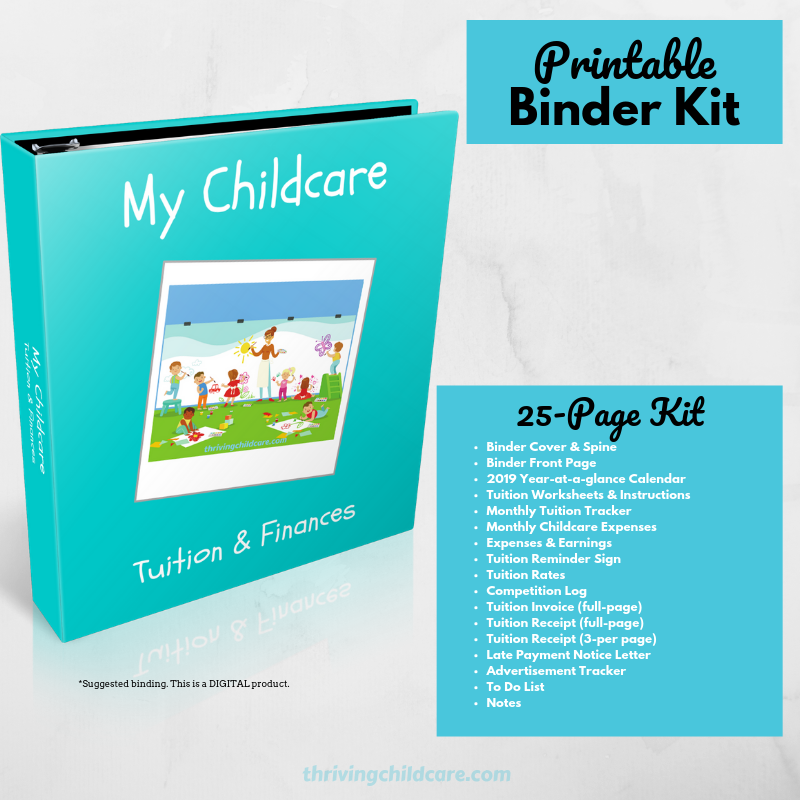Recently I was involved in a discussion regarding whether or not a childcare provider should offer a discount. The issue is specifically related to a sibling discount. Although other providers disagree with offering this as well as other types of discounts, I thought it might be helpful to discuss the overall topic of offering daycare discounts. Keep reading for a FREE DOWNLOAD!
Daycare Discounts
Should You Offer A Discount?
As I said, many providers are of the opinion that they should not offer discounts for their childcare services. They argue that when you consider the fact that most home childcare providers are limited as to the enrollment they can have, offering a daycare discount significantly impacts the bottom line. In turn, this would cause a loss of income overall.
Believe me, I get it!
I can remember a few times when I agreed to discount my tuition fee for a family. Whenever an issue with that family arose I would contemplate just how much money I was losing because of the reduced rate they received. I would shake it off and remind myself that it wasn’t fair to judge them because I was the one who agreed to the discounted rate they paid.
Over the years, I have to say that I have made quite a few adjustments in the way I handle requests for discounts or when I would offer a daycare discount. In general, I would caution against offering too many discounts to childcare clients.
There are, however, just like anything else sometimes when you gotta do what you gotta do.
When to Offer a Daycare Discount?
But what if you are in an area of your city where there is a lot of competition? In my neighborhood, there are about 12 child cares within a one-mile radius.
Can you say competitive? With that level of overlap, I need to constantly find ways for my business to stand out in the crowd.
Or maybe you are a new provider and being a newbie you don’t really have the credibility to pull in the first clients that you need to start your business.
The fact is many larger daycare centers offer some sort of discount to their clients.
In either of these cases, you might be inclined to think about offering a daycare discount as an incentive to attract clients to your business. If so and you were to offer a discount, what would that look like? Is it just for siblings or do you offer other discounts?

What Kind of Discount To Offer?
Monthly tuition discount
I currently offer my clients a discount if they submit their tuition in one monthly lump sum. The discount is very small when calculated over the 52 weeks in the year. Actually, the rate winds up being not much less than the usual weekly tuition rate.
I usually offer this on the tour when I meet with the parents. This discount has been really helpful for my business as it has all but eliminated much of the “reminding” I was having to do each week and has cut down on the repeated trips to the bank.
Parents like it because they only need to remember payment once a month. Here’s a free download of the Tuition Worksheet I use.
[raw_html_snippet id="tuition worksheet content upgrade"] |
Sibling Discount
This one is fairly standard for many businesses. I have mentioned before that my current discount for siblings was the result of a former client mentioning that her new daycare offered less of a discount for her two children than I did. Realizing that I probably could least afford to offer the larger discount, I lowered my sibling rate.
There is a trick to this too.
If you do decide to offer the sibling discount, consider offering it on the older child’s tuition only. That way if the younger child remains with you longer, you will receive their full tuition when the older child leaves.
Short Term Discount
At some point, many providers may encounter a client that is in need of a hardship consideration. Maybe a parent has been laid off or a family has just relocated to the area and they are having a temporary financial hardship. Out of compassion, you might consider offering a discount of childcare tuition to help out the family.
The tip here is to place a limitation on that period, in other words, consider making it a short-term discount. This allows the provider to accept the client and extend a helping hand, but in short, they will receive the full tuition payment for that spot.
I think that is important because while hardship may come it rarely lasts indefinitely.
Enrollment Discount
So this one is just a “sort of” discount. What I mean is this is the kind of discount a provider could offer all the time.
For instance, I have an Enrollment Fee for a new family. The fee is basically to cover the cost of a new playpen, mat, or cot for the new child. As a courtesy, I offer to waive this fee if the family agrees to supply the playpen. Many families opt to supply the playpen and don’t owe the fee.
It works for me! I don’t have to go out to the store and it works for the family because they feel as though they received a break.
Vacation discount
Many providers extend discounted tuition during the time of vacations (either for the provider or the client). Usually, this is half of the normal tuition fees.
While this still allows the provider to receive a portion of the tuition, parents appreciate the discount. This is especially helpful to parents when the provider is out. Simply because the parents will more than likely need to find and pay for alternative care during the vacation period.
It might be worth developing a specific policy regarding vacations, just so that the provider doesn’t encounter a family that vacations every other month.
Yeah, that happens!
Referral discount
This is another incentive-based discount program. Simply put, if a current client refers another family that enrolls at your childcare you offer an incentive for that referral.
A provider could offer $ off tuition, a gift card, a free day of care, etc. You can really work this any way that works for your business and budget.
Pick ONE!
One final note; I do have a policy of not combining discounts. Meaning, a family can only use one of our discount programs at a time. They cannot combine them.
Yep had someone ask me about that too!
Related Reading:
- How to set your rates & when to raise them, Part 1
- Essential Policies for Child Care Providers
- How to make policy changes
Want to remember this? Save “Daycare Discounts?” to your favorite Pinterest boards!













